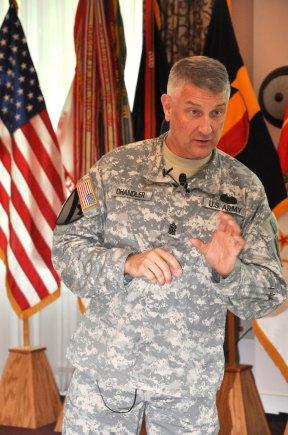FORT EUSTIS, Va. -- Sgt. Maj. of the Army Raymond F. Chandler III discussed Army professionalism and senior enlisted leader expectations of new officers during the Basic Officer Leader Course conference hosted by U.S. Army Training and Doctrine Command's Initial Military Training Center of Excellence at Fort Eustis, June 5.
"I was given the task to look at the Army uniform, the Army's brand," Chandler told the crowd of officers, warrant officers and senior noncommissioned officers. "We need to take a hard look at ourselves, look at the pillars of our foundation and how we present ourselves to the public."
The BOLC conference, attended by brigade and battalion commanders, command sergeants major, Army course managers, and warrant officer regimental representatives, afforded leaders the opportunity to exchange information to assist in the ongoing development of their programs.
Chandler challenged the group of BOLC attendees to reinforce to Soldiers that they are professionals 24 hours a day, on and off duty, and that the Warrior Ethos and the Army values are the measuring sticks of Soldiers' conduct.
"Help these young men and women understand that the Warrior Ethos and the Army values are not a slogan -- not a poster you put on a wall," he said. "It is in line with our profession. It is about professionalism. We (leaders) have to coach, teach and mentor these young Soldiers to be the professionals we are.
Another way TRADOC is working to better define and strengthen the profession is through the Army Profession Campaign, a self-initiated look at the force that began in 2010 under the direction of the secretary and the chief of staff of the Army.
In April, the Center for the Army Profession and Ethic, known as CAPE, at West Point, N.Y, released the campaign's first yearlong study on the current state of the profession and the way ahead, which included feedback from more than 40,000 Army professionals across the service.
"Essentially, what we have done is a half of a million surveys and hundreds of sensing sessions to ask this young generation if they want to be a profession," said Gen. Robert W. Cone, TRADOC's commanding general, during the vice chief of staff's recent visit to TRADOC. "And the beauty of this is that they have self-critiqued. They have said, 'yes, we want to be a profession,' and they have defined what a profession means."
Defining the Army Profession and the importance of being a professional comes at a critical time, as the Army faces the drawdown of some 90,000 Soldiers throughout the next five years. According to Chandler, it is about retaining the best. If an NCO is in a stagnant Military Occupational Skill and has not been promoted, there is the chance he or she may have to leave the Army.
"There will be a couple of review boards this year," he said. "To stay in the service, you are going to have to be competitive with your peers, to be the best of the best. If you're not and you are in a stagnant MOS, the commander has the authority to deny you re-enlistment, and that's significant."
He said it's a complex world we live in today -- especially when it comes to easy access to social media and how Soldiers who are not doing the right thing or may not be educated on what it means to "do right" are using social media platforms to display less-than-ideal behavior.
"You have to ask yourself as leaders -- are these young people living the Army values? Are they professionals? We've had these (values) for quite some time, and they are ingrained in those of us who are career Soldiers," Chandler explained. "However, for the young men and women that it's not ingrained, we have to take a different approach."
A synchronized effort to combine a new lieutenant's eagerness to lean forward and take his troops as far as they can go with the wisdom and experience of that officer's senior NCO, creates a recipe for success. That success -- troops who are inspired to uphold the Army standard, live the core values and push themselves to be the best they can be.
After spending the last 10 years at war, the Army is in a time of transition. Chandler cited the Army Profession Concept, which is reaffirming the service's identity, values and purpose. Inspiring the force through renewed understanding of the noble purpose and duty of the Army will help to reestablish and strengthen its professional military culture.
"The Army is comprised of great men and women," said Chandler, who has 31 years of service to his credit, "but there is work to be done. Doing the right thing is not always glamorous, but it sets the standard for our Soldiers."




























